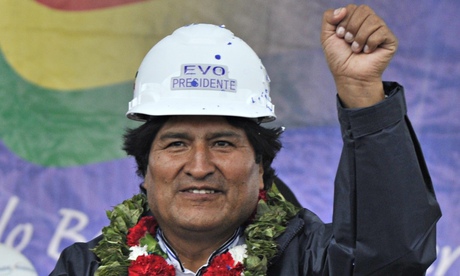
Dean Mouhtaropoulos
One of the most accidentally revealing media accounts highlighting the real meaning of “democracy” in U.S. discourse is a still-remarkable 2002 New York Times Editorial on the U.S.-backed military coup in Venezuela, which temporarily removed that country’s democratically elected (and very popular) president, Hugo Chávez. Rather than describe that coup as what it was by definition - a direct attack on democracy by a foreign power and domestic military which disliked the popularly elected president – the Times, in the most Orwellian fashion imaginable, literally celebrated the coup as a victory for democracy:
More amazingly still, the Times editors told their readers that Chávez’s “removal was a purely Venezuelan affair,” even though it was quickly and predictably revealed that neocon officials in the Bush administration played a central role. Eleven years later, upon Chávez’s death, the Times editors admitted that “the Bush administration badly damaged Washington’s reputation throughout Latin America when it unwisely blessed a failed 2002 military coup attempt against Mr. Chávez” [the paper forgot to mention that it, too, blessed (and misled its readers about) that coup]. The editors then also acknowledged the rather significant facts that Chávez’s “redistributionist policies brought better living conditions to millions of poor Venezuelans” and “there is no denying his popularity among Venezuela’s impoverished majority.”
If you think The New York Times editorial page has learned any lessons from that debacle, you’d be mistaken. Today they published an editorial expressing grave concern about the state of democracy in Latin America generally and Bolivia specifically. The proximate cause of this concern? The overwhelming election victory of Bolivian President Evo Morales (pictured above), who, as The Guardian put it, “is widely popular at home for a pragmatic economic stewardship that spread Bolivia’s natural gas and mineral wealth among the masses.”
The Times editors nonetheless see Morales’ election to a third term not as a vindication of democracy but as a threat to it, linking his election victory to the way in which “the strength of democratic values in the region has been undermined in past years by coups and electoral irregularities.” Even as they admit that “it is easy to see why many Bolivians would want to see Mr. Morales, the country’s first president with indigenous roots, remain at the helm” – because “during his tenure, the economy of the country, one of the least developed in the hemisphere, grew at a healthy rate, the level of inequality shrank and the number of people living in poverty dropped significantly” - they nonetheless chide Bolivia’s neighbors for endorsing his ongoing rule: “it is troubling that the stronger democracies in Latin America seem happy to condone it.”
The Editors depict their concern as grounded in the lengthy tenure of Morales as well as the democratically elected leaders of Ecuador and Venezuela: “perhaps the most disquieting trend is that protégés of Mr. Chávez seem inclined to emulate his reluctance to cede power.” But the real reason the NYT so vehemently dislikes these elected leaders and ironically views them as threats to “democracy” becomes crystal clear toward the end of the editorial (emphasis added):
It is, of course, true that democratically elected leaders are capable of authoritarian measures. It is, for instance, democratically elected U.S. leaders who imprison people without charges for years, build secret domestic spying systems, and even assert the power to assassinate their own citizens without due process. Elections are no guarantee against tyranny. There are legitimate criticisms to be made of each of these leaders with regard to domestic measures and civic freedoms, as there is for virtually every government on the planet.
But the very idea that the U.S. government and its media allies are motivated by those flaws is nothing short of laughable. Many of the U.S. government’s closest allies are the world’s worst regimes, beginning with the uniquely oppressive Saudi kingdom (which just yesterday sentenced a popular Shiite dissident to death) and the brutal military coup regime in Egypt, which, as my colleague Murtaza Hussain reports today, gets more popular in Washington as it becomes even more oppressive. And, of course, the U.S. supports Israel in every way imaginable even as its Secretary of State expressly recognizes the “apartheid” nature of its policy path.
Just as the NYT did with the Venezuelan coup regime of 2002, the U.S. government hails the Egyptian coup regime as saviors of democracy. That’s because “democracy” in U.S. discourse means: “serving U.S. interests” and “obeying U.S. dictates,” regardless how how the leaders gain and maintain power. Conversely, “tyranny” means “opposing the U.S. agenda” and “refusing U.S. commands,” no matter how fair and free the elections are that empower the government. The most tyrannical regimes are celebrated as long as they remain subservient, while the most popular and democratic governments are condemned as despots to the extent that they exercise independence.
To see how true that is, just imagine the orgies of denunciation that would rain down if a U.S. adversary (say, Iran, or Venezuela) rather than a key U.S. ally like Saudi Arabia had just sentenced a popular dissident to death. Instead, the NYT just weeks ago uncritically quotes an Emirates ambassador lauding Saudi Arabia as one of the region’s “moderate” allies because of its service to the U.S. bombing campaign in Syria. Meanwhile, the very popular, democratically elected leader of Bolivia is a grave menace to democratic values – because he’s “dismal for Washington’s influence in the region.”
Photo: Dean Mouhtaropoulos/Getty Images
With yesterday’s resignation of President Hugo Chávez, Venezuelan democracy is no longer threatened by a would-be dictator. Mr. Chávez, a ruinous demagogue, stepped down after the military intervened and handed power to a respected business leader, Pedro Carmona.Thankfully, said the NYT, democracy in Venezuela was no longer in danger . . . because the democratically-elected leader was forcibly removed by the military and replaced by an unelected, pro-U.S. “business leader.” The Champions of Democracy at the NYT then demanded a ruler more to their liking: “Venezuela urgently needs a leader with a strong democratic mandate to clean up the mess, encourage entrepreneurial freedom and slim down and professionalize the bureaucracy.”
More amazingly still, the Times editors told their readers that Chávez’s “removal was a purely Venezuelan affair,” even though it was quickly and predictably revealed that neocon officials in the Bush administration played a central role. Eleven years later, upon Chávez’s death, the Times editors admitted that “the Bush administration badly damaged Washington’s reputation throughout Latin America when it unwisely blessed a failed 2002 military coup attempt against Mr. Chávez” [the paper forgot to mention that it, too, blessed (and misled its readers about) that coup]. The editors then also acknowledged the rather significant facts that Chávez’s “redistributionist policies brought better living conditions to millions of poor Venezuelans” and “there is no denying his popularity among Venezuela’s impoverished majority.”
If you think The New York Times editorial page has learned any lessons from that debacle, you’d be mistaken. Today they published an editorial expressing grave concern about the state of democracy in Latin America generally and Bolivia specifically. The proximate cause of this concern? The overwhelming election victory of Bolivian President Evo Morales (pictured above), who, as The Guardian put it, “is widely popular at home for a pragmatic economic stewardship that spread Bolivia’s natural gas and mineral wealth among the masses.”
The Times editors nonetheless see Morales’ election to a third term not as a vindication of democracy but as a threat to it, linking his election victory to the way in which “the strength of democratic values in the region has been undermined in past years by coups and electoral irregularities.” Even as they admit that “it is easy to see why many Bolivians would want to see Mr. Morales, the country’s first president with indigenous roots, remain at the helm” – because “during his tenure, the economy of the country, one of the least developed in the hemisphere, grew at a healthy rate, the level of inequality shrank and the number of people living in poverty dropped significantly” - they nonetheless chide Bolivia’s neighbors for endorsing his ongoing rule: “it is troubling that the stronger democracies in Latin America seem happy to condone it.”
The Editors depict their concern as grounded in the lengthy tenure of Morales as well as the democratically elected leaders of Ecuador and Venezuela: “perhaps the most disquieting trend is that protégés of Mr. Chávez seem inclined to emulate his reluctance to cede power.” But the real reason the NYT so vehemently dislikes these elected leaders and ironically views them as threats to “democracy” becomes crystal clear toward the end of the editorial (emphasis added):
This regional dynamic has been dismal for Washington’s influence in the region. In Venezuela, Bolivia and Ecuador, the new generation of caudillos [sic] have staked out anti-American policies and limited the scope of engagement on development, military cooperation and drug enforcement efforts. This has damaged the prospects for trade and security cooperation.You can’t get much more blatant than that. The democratically elected leaders of these sovereign countries fail to submit to U.S. dictates, impede American imperialism, and subvert U.S. industry’s neoliberal designs on the region’s resources. Therefore, despite how popular they are with their own citizens and how much they’ve improved the lives of millions of their nations’ long-oppressed and impoverished minorities, they are depicted as grave threats to “democracy.”
It is, of course, true that democratically elected leaders are capable of authoritarian measures. It is, for instance, democratically elected U.S. leaders who imprison people without charges for years, build secret domestic spying systems, and even assert the power to assassinate their own citizens without due process. Elections are no guarantee against tyranny. There are legitimate criticisms to be made of each of these leaders with regard to domestic measures and civic freedoms, as there is for virtually every government on the planet.
But the very idea that the U.S. government and its media allies are motivated by those flaws is nothing short of laughable. Many of the U.S. government’s closest allies are the world’s worst regimes, beginning with the uniquely oppressive Saudi kingdom (which just yesterday sentenced a popular Shiite dissident to death) and the brutal military coup regime in Egypt, which, as my colleague Murtaza Hussain reports today, gets more popular in Washington as it becomes even more oppressive. And, of course, the U.S. supports Israel in every way imaginable even as its Secretary of State expressly recognizes the “apartheid” nature of its policy path.
Just as the NYT did with the Venezuelan coup regime of 2002, the U.S. government hails the Egyptian coup regime as saviors of democracy. That’s because “democracy” in U.S. discourse means: “serving U.S. interests” and “obeying U.S. dictates,” regardless how how the leaders gain and maintain power. Conversely, “tyranny” means “opposing the U.S. agenda” and “refusing U.S. commands,” no matter how fair and free the elections are that empower the government. The most tyrannical regimes are celebrated as long as they remain subservient, while the most popular and democratic governments are condemned as despots to the extent that they exercise independence.
To see how true that is, just imagine the orgies of denunciation that would rain down if a U.S. adversary (say, Iran, or Venezuela) rather than a key U.S. ally like Saudi Arabia had just sentenced a popular dissident to death. Instead, the NYT just weeks ago uncritically quotes an Emirates ambassador lauding Saudi Arabia as one of the region’s “moderate” allies because of its service to the U.S. bombing campaign in Syria. Meanwhile, the very popular, democratically elected leader of Bolivia is a grave menace to democratic values – because he’s “dismal for Washington’s influence in the region.”
Photo: Dean Mouhtaropoulos/Getty Images
Email the author: glenn.greenwald@theintercept.com

